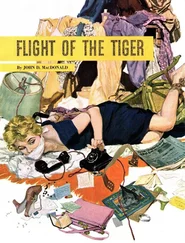“Crissy. Please! They were okay, and then they phoned you, and then they said they’d let me know. But I could tell it was off. Damn it, that was a good job. If you put the knife in me, I’ve got to know why . And I’ve got to know what I have to do so you won’t do it the next time.”
“What’s the matter with you? Every single word I said about you was a top recommendation. Why should I do anything else?”
He sat on the straight chair by her desk and shook his head dolefully. “I don’t get it. I don’t know what turned them off then. What you have to understand, it’s a time thing. There are more guys with the papers than there are owners who want a hired crew. You come off one job, that’s when you have to move into the next one. You try to line something up, and the owner finds out you’ve been on the beach two or three months, he thinks you’re a clown. I thought — you were sore at me for something I’d done or didn’t do. Look, could you give me a regular letter? Please?”
“Okay,” she said. “Sure, Garry.” She went slowly toward him, feeling a quickening of herself which grew more immediate with each step. She knew it was not a specific desire for a specific individual named Garry Staniker. It was a way to turn off all thought. He was a hiding place. He had the weight and skill and enough special knowledge of her ways and wants to turn the world off, and out of his anxiety would come a doggy earnestness to please. Then sleep would be deep. She had not been sleeping well.
When the next prospective employer phoned her she was prepared to recommend Staniker highly, but the man who phoned was the personnel manager of an electronics firm which owned a corporation boat, and in a most contentious and irritating way he cross-examined her over each answer she gave. “How do you know that?” “What makes you think he’s competent in that area?”
She said, “Little man, you seem confused. I’m not applying for a job.”
“It’s my job to double check these things, Mrs. Harkinson. Please don’t tell me how to do my job. When the safety of the executives of this corporation is involved...”
His voice faded as she reached and dropped the phone back onto the cradle.
Through the hot months she lazed and drifted in a self-indulgent stupor, baking herself in the sun, getting fuzzy on the midday drinks, taking long naps in the cool darkened bedroom, watching much television in the evenings. She told herself that she could not really make any plans until the cruiser was sold. The money was going. She knew she ought to get rid of Francisca, perhaps try to rent the house, make an effort to get a good price for the jewelry she had left. But she would push those thoughts aside, stretch and yawn and shout for Francisca to bring her a drink.
Several times through the hot months and into the coolness of the beginning of a new season, she became aware of the dangerous softness and heaviness of her body. Then she would spend days in the disciplines of exercise, diet, abstinence. She would try on everything she owned and leave the bedroom and dressing room heaped with clothing for Francisca to put away.
Staniker had gone to work at the marina where his Mary Jane worked. The man who had been working there had been caught pocketing some of the boat-rental money. The marina was not far away. There were no set hours when he had to be there. He and Mary Jane lived in a cottage on the marina property. Staniker stopped by to see Crissy quite often, arriving in his old car or in one of the rental outboards. He complained constantly. He said he was looking for better work all the time. Yet when she asked specific questions, he became vague and evasive.
They would drink together. Sometimes they would go to bed. They quarreled often. She had lost a measure of control over him when he realized she was no longer capable of helping him find a job. Sometimes he became ugly when he drank too much, and a few times he struck her and hurt her. At those times he told her she was his bad luck. She had spoiled everything for him forever. For a time she could not understand why, after she would become so angry with him she would tell him never to come back, he would make such humble and earnest efforts to regain her favor.
She realized one day that she was a necessary part of his status, of the fiction he made of himself. As long as he could come without invitation to this beautiful and isolated house where lived the attractive blonde ex-mistress of an influential man, and drink her liquor, be brought food by her maid, swim in her pool, pull her into bed, then he was maintaining one final contact with the golden world of yachts and ports and parties, and the inner image of the bronzed captain on the fly bridge, nodding down with amiable and knowing grin at the banquet of girls spread sun-struck on the foredeck.
So long as this relationship could be maintained, he could pretend that the dreary little beer, bait, outboard rental marina was but a temporary setback in the shining career of youthful Garry Staniker. And she could guess that, for the sake of his self-esteem, he would by nod, wink, nudge, veiled phrase, let the people know that Staniker had a good thing going.
In January the Odalisque was sold. She had cut the asking price several times. The offer she accepted was still lower. The expenses of sale were heavy. And there were bills to pay out of the cash she received, including back pay for Francisca. The amount she had left was frighteningly small.
Still she could not seem to stir herself to change anything. There was still the house itself. Prime waterfront. It would sell for a good amount of cash. She did not try to find out how much. She did not want to think in exact terms, because if she knew how much, then she would begin to work out how long it would last her.
In sleep she began to dream quite often of old times, before she had met Fer Fontaine. It was a life where you were told what you would do and where you would be. Punishment was brutal and immediate. She would awaken from such dreams with a curious sense of regret and nostalgia. It had not been a mode of life she had sought, or even realized what currents of chance had drifted her into it. She had told herself it was something she was doing for a little while. But the little while had been years.
And then, as if awakening from another kind of sleep, she came out of the long lethargy of waiting on that last day of March when Bixby Kayd came to see her. He had been at the house several times when Fer was alive, when a small group of men were quietly buying up raw land, marl deposits, gravel pits and central mix plants along the route for a big new highway later to be announced officially by the State Road Board. As a familiar index of the man’s importance, Crissy knew he had also gone on some of the Senator’s little cruises aboard the Odalisque, those cruises which would include the more special members of the larger group, the ones capable of making those special arrangements which would make their share a little richer than the shares the smaller fry would get.
Bix had phoned her and arrived a half hour later in a rental limousine. He sat in an armchair, facing her, in the living room beside her slate fireplace — a big, brown, beaming man with a loud jocular voice, custom-tailored suit in western style in sand-colored twill, elaborate stitching of boots, pale stetson on the floor beside his chair, the bourbon on ice she had fixed him looking dwarfed by the size of his hand. His hair, with the light behind him, was a sandy stubble a quarter inch long covering those places on his big skull which had not gone bald.
Francisca, as she had requested, brought in the tray of small crackers, the spiced cheese melted and hot atop them, slightly brown by the broiler flame, passed them, put the tray down within Mr. Kayd’s reach.
Читать дальше






![Джон Макдональд - Wine of the Dreamers [= Planet of the Dreamers]](/books/430039/dzhon-makdonald-wine-of-the-dreamers-planet-of-thumb.webp)




![Джон Макдональд - The Hunted [Short Story]](/books/433679/dzhon-makdonald-the-hunted-short-story-thumb.webp)
